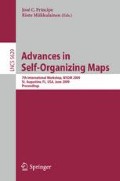Abstract
We explore generic mechanisms to introduce structural hints into the method of Unsupervised Kernel Regression (UKR) in order to learn representations of data sequences in a semi-supervised way. These new extensions are targeted at representing a dextrous manipulation task. We thus evaluate the effectiveness of the proposed mechanisms on appropriate toy data that mimic the characteristics of the aimed manipulation task and thereby provide means for a systematic evaluation.
Access this chapter
Tax calculation will be finalised at checkout
Purchases are for personal use only
Preview
Unable to display preview. Download preview PDF.
References
Barreto, G., Araújo, A., Ritter, H.: Self-Organizing Feature Maps for Modeling and Control of Robotic Manipulators. Intelligent and Robotic Systems 30(4) (2003)
Bishop, C., Legleye, C.: Estimating conditional probability densities for periodic variables. In: Advances in Neural Information Processing Systems, vol. 7, pp. 641–648 (1995)
Jolliffe, I.T.: Principal Component Analysis, 2nd edn. Springer, New York (2002)
Klanke, S.: Learning Manifolds with the Parametrized Self-Organizing Map and Unsupervised Kernel Regression. PhD thesis, Bielefeld University (2007)
Mardia, K.: Statistics of Directional Data. Academic Press, London (1972)
Meinicke, P., Klanke, S., Memisevic, R., Ritter, H.: Principal Surfaces from Unsupervised Kernel Regression. IEEE Trans. on PAMI 27(9) (2005)
Nadaraya, E.A.: On Estimating Regression. Theory of Probability and Its Application 9 (1964)
Schölkopf, B., Smola, A., Müller, K.: Nonlinear Component Analysis as a Kernel Eigenvalue Problem. Neural Computation 10(5), 1299–1319 (1998)
Steffen, J., Haschke, R., Ritter, H.: Towards Dextrous Manipulation Using Manifolds. In: Proc. IROS (2008)
Tenenbaum, J.B., de Silva, V., Langford, J.C.: A global geometric framework for nonlinear dimensionality reduction. Science 290(5500), 2319–2323 (2000)
Walter, J., Ritter, H.: Rapid Learning with Parametrized Self-organizing Maps. Neurocomputing 12, 131–153 (1996)
Watson, G.S.: Smooth Regression Analysis. Sankhya, Ser. A 26 (1964)
Author information
Authors and Affiliations
Editor information
Editors and Affiliations
Rights and permissions
Copyright information
© 2009 Springer-Verlag Berlin Heidelberg
About this paper
Cite this paper
Steffen, J., Klanke, S., Vijayakumar, S., Ritter, H. (2009). Towards Semi-supervised Manifold Learning: UKR with Structural Hints. In: Príncipe, J.C., Miikkulainen, R. (eds) Advances in Self-Organizing Maps. WSOM 2009. Lecture Notes in Computer Science, vol 5629. Springer, Berlin, Heidelberg. https://doi.org/10.1007/978-3-642-02397-2_34
Download citation
DOI: https://doi.org/10.1007/978-3-642-02397-2_34
Publisher Name: Springer, Berlin, Heidelberg
Print ISBN: 978-3-642-02396-5
Online ISBN: 978-3-642-02397-2
eBook Packages: Computer ScienceComputer Science (R0)

